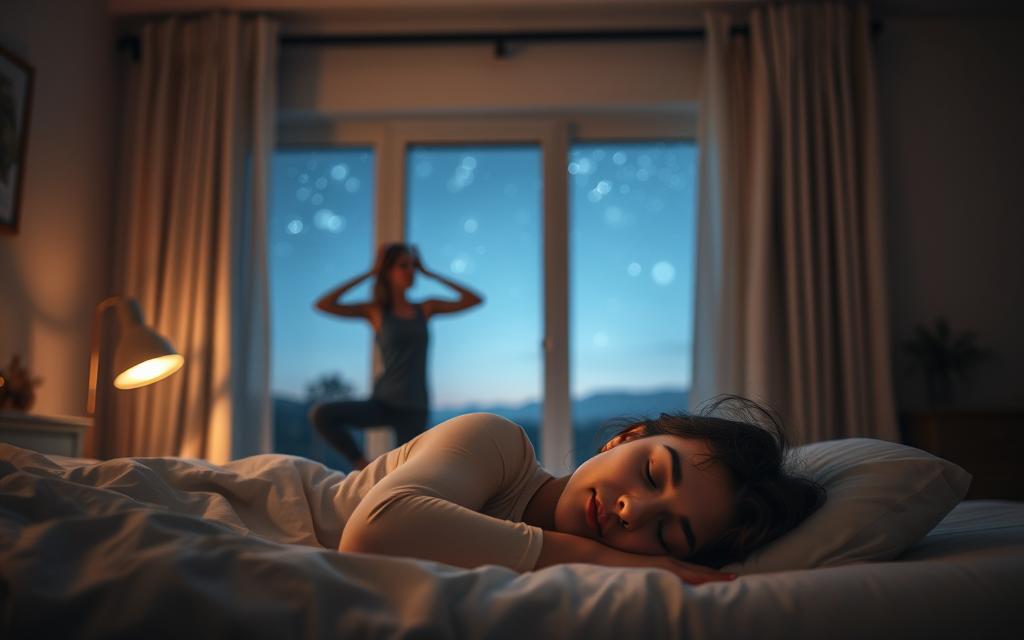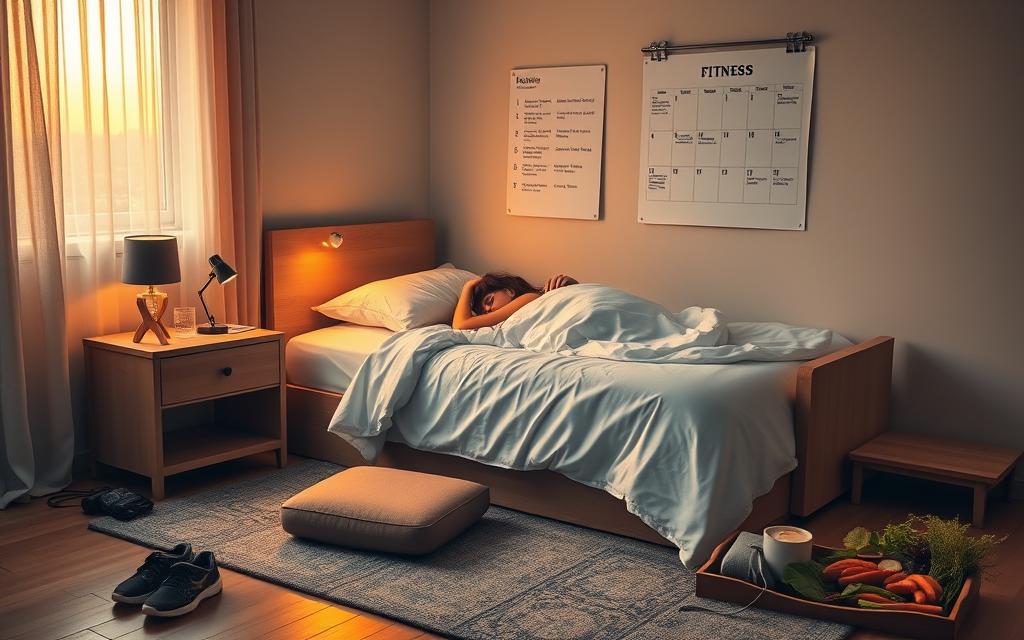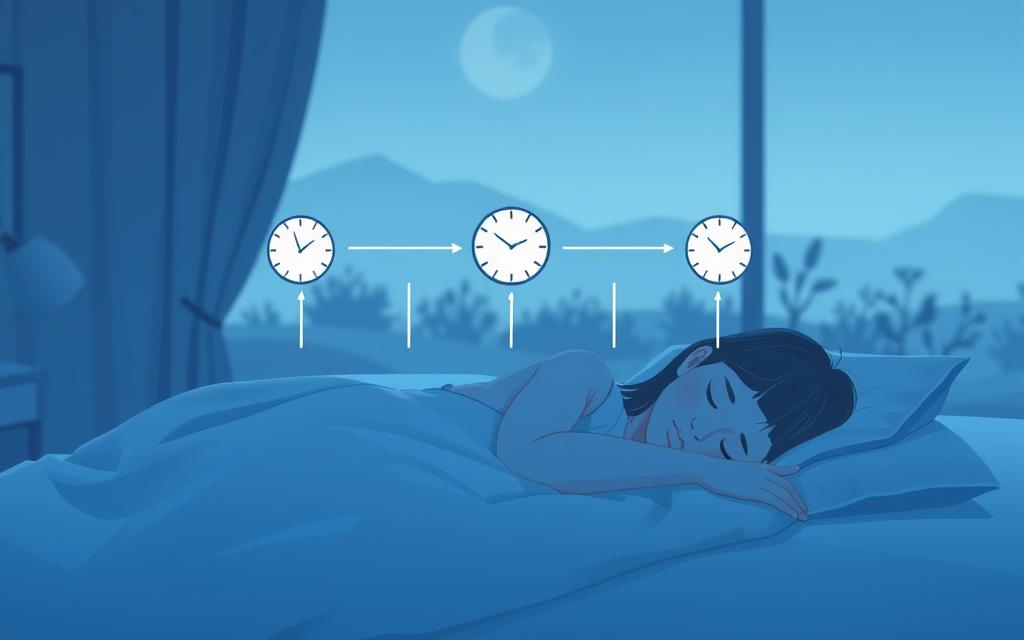Have you ever spent a sleepless night, staring at the ceiling while the clock ticks mercilessly? You’re not alone—about one-third of Americans get less than seven hours of sleep. This frustration makes us wonder: How do what we eat and how much we move affect our sleep?
Understanding the sleep quality connection between diet and exercise is key. It’s not just for a good night’s sleep but for our overall health. Studies show that eating right and staying active can help with sleep problems. In today’s busy world, focusing on these optimal wellness practices can make our lives healthier and more fulfilling. It lets us wake up feeling refreshed and ready to tackle the day.
Research shows that eating too many calories or fats can hurt sleep quality. Not getting enough nutrients can also make sleep worse1. On the other hand, regular exercise, whether it’s aerobic or resistance training, can make sleep better2. The path to better sleep starts with knowing how our choices affect our nights and days.
Key Takeaways
- Diets high in nutrients like calcium and vitamins can enhance sleep quality.
- Regular exercise improves sleep duration and quality.
- Sleep deprivation is linked to serious health risks like obesity and heart disease.
- Even light physical activity can lead to better sleep outcomes.
- Exercising close to bedtime should be done mindfully to avoid sleep disruption.
The Connection Between Diet, Exercise, and Sleep
Diet and exercise are key to good sleep. Eating right helps set a good sleep pattern. Regular workouts also improve sleep quality.
A 2020 study found that the Mediterranean Diet boosts sleep in adult women in the U.S3.. Eating more protein and less carbs and fats also leads to better sleep3. Meals high in protein and fiber, but low in sugar and unhealthy carbs, also improve sleep3.
Exercise can fight the effects of not sleeping well. Poor sleep can make us choose unhealthy foods, starting a bad cycle4. Lack of magnesium and vitamin D can cause insomnia and restless sleep34. Combining exercise with a healthy diet can lead to better sleep, more energy, and a better mood.

Importance of Maintaining Healthy Lifestyle Habits
Healthy lifestyle habits are key to feeling your best. Regular exercise and a balanced diet boost both physical and mental health. This combo is essential for quality sleep, as studies show a strong link between sleep, diet, exercise, and stress5.
Following a sleep routine is important. This includes setting a consistent sleep schedule and avoiding too much caffeine. These habits can improve your overall health5.
Adding exercise to your daily life helps your mental health too. It can lower depression and anxiety, boost self-esteem, and help you connect with others67. These habits not only improve sleep but can also increase your life expectancy5.

Impact of Nutrition on Sleep Quality
Diet plays a big role in how well we sleep. Short sleepers, who sleep less than 7 hours, often eat less varied diets. They also eat fewer important nutrients like protein, carbs, and fats. This can make them feel more tired and sleep worse8.
Eating too much junk food and processed carbs can hurt sleep. For example, eating lots of carbs, but not the good kind, can make sleep worse8. Also, eating snacks too late or skipping breakfast can mess up sleep9.
Eating enough protein is key for good sleep. Not enough protein can make it hard to fall asleep. But eating more protein can help you sleep better8. Also, eating the right amount of carbs helps keep sleep steady, showing that it’s not just about how much you eat, but what you eat8.

How Exercise Improves Sleep Quality
Exercise is key to better sleep. It lowers cortisol, the stress hormone that disrupts sleep. Studies show that intense workouts help reduce cortisol, leading to better sleep.
For those with insomnia or sleep apnea, exercise helps. A study found that HIIT improved sleep for middle-aged adults who were not active10.
When you exercise matters too. Exercising later in the day leads to deeper sleep and feeling refreshed11. Moderate to vigorous exercise also helps by making it easier to fall asleep and reducing nighttime wake-ups11.
Older adults benefit from exercise too. It improves sleep quality and reduces daytime sleepiness10. Exercise also boosts melatonin, helping you sleep naturally and stay well12.
Adults should aim for 150 minutes of moderate exercise weekly and strength training twice a week11. This shows how diet and exercise impact sleep. In short, combining exercise with good sleep habits greatly improves sleep health12.

Diet and Exercise Affect Rest
It’s important to know how diet and exercise impact sleep. What we eat can affect how well we sleep. Foods high in sugar, fat, or low in fiber can make it hard to sleep well13.
Not eating enough of the right foods can also hurt sleep quality13. Eating at irregular times can lead to obesity, which can make sleep worse13.

Influence of Diet on Sleep Patterns
Caffeine and alcohol before bed can make sleep poor13. Not getting enough sleep can make us hungrier and eat more the next day14. This can mess up our sleep even more because it changes how our body feels full or hungry14.
Role of Exercise in Sleep Stability
Exercise helps sleep by making it deeper and more stable. People who exercise regularly sleep 75 minutes more each night14. It also helps them fall asleep faster, leading to better sleep14.
Nutritional Factors That Affect Sleep Quality
Knowing what foods affect sleep can really help your health. Foods like fish, nuts, and seeds help with sleep. They have melatonin, which is good for sleep cycles15.
Foods rich in tryptophan, like poultry and eggs, can also help. They boost serotonin, making sleep better15. Magnesium in legumes and greens is key for a good sleep-wake cycle16.
But, foods high in sugar and refined carbs can hurt sleep16. Not getting enough vitamins A, C, D, E, calcium, and magnesium can also make sleep worse17. People with low nutrient levels often sleep less and wake up more16.
When and what you eat can also matter. Eating big meals before bed can make it hard to sleep16. Research shows fasting for 12 hours can make sleep better16. Eating wisely is key to better sleep.

Timing of Meals and Sleep Quality
The timing of meals greatly affects sleep quality. Eating late can make it hard to fall asleep and stay asleep. Studies show that eating at night can harm sleep in healthy people18.
Digestion problems from big meals before bed are a big reason. Experts say to wait at least three hours after dinner to sleep better18.
Effects of Late-Night Eating
Eating late can cause indigestion and make it hard to relax18. A study found that big dinners can lead to insulin resistance, unlike big breakfasts18. Eating a small dinner three hours before bed can help with sleep and reduce heartburn18.
Research also links late-night eating to obesity and metabolic syndrome18. Bad food choices during the day can also make sleep lighter and less refreshing19.
To improve sleep, it’s key to have regular meal times and a consistent sleep schedule. Following these tips can greatly improve sleep and health.

Aerobic vs. Resistance Training: Which is Better for Sleep?
The debate between aerobic vs. resistance training for sleep is common. Studies show that resistance training is better for sleep in adults under 65. It beats aerobic exercise in improving sleep quality20.
A meta-analysis of 34 studies found that exercise improves sleep in about 85.3% of cases21. Those who did resistance training slept 40 minutes more than those who did aerobic exercises20. The American Heart Association suggests doing strength training at least twice a week for better sleep20.
Over 400 overweight or obese adults were studied. They who did muscle-building exercises slept 17 minutes more each year than others22. Those who did both aerobic and resistance training saw big sleep improvements. But those who only did cardio didn’t see the same gains22.
To get better sleep, doing fun physical activities is key. Knowing the benefits of both aerobic and resistance training helps create a good fitness plan. This leads to better sleep.
The Holistic Health Approach to Sleep
A holistic health approach looks at how diet, exercise, and rest work together to improve sleep. This method not only helps you sleep better but also boosts your overall health. It’s a way to reach long-term health goals.
Integration of Diet, Exercise, and Rest
About 70 million Americans deal with sleep disorders, showing a big health problem. Adults need 7-9 hours of sleep each night for good health. But many don’t get enough23.
Keeping a regular sleep schedule is key. Studies say it can make sleep up to 30% better23.
What you eat affects your sleep too. Foods like turkey and dairy help make melatonin, which is important for sleep24. Foods with magnesium, like almonds, also help you relax and sleep better24.
Exercise is also vital. Doing 150 minutes of moderate exercise a week is good for sleep. It’s best to exercise 3-4 hours before bedtime24.
Using mindfulness and relaxation before bed can also help. Just 5-10 minutes of deep breathing or meditation can improve sleep. This shows how important a holistic approach is24.

Importance of Diet and Exercise for Optimal Wellness Practices
Diet and exercise play a big role in how well we rest. Eating right helps keep our weight in check. And, staying active boosts both our physical and mental health. Studies show that 150 minutes of moderate exercise a week is key for staying healthy25.
Regular workouts also lower the risk of serious health issues like heart disease and diabetes26.
Combining diet and exercise is more effective than just one or the other. Research shows that eating less and exercising more can lead to more weight loss than exercise alone27. By eating healthier and exercising regularly, we become more resilient to stress and sleep better. Exercise also makes us feel happier by releasing endorphins, making it essential26.
Practicing mindful eating helps us manage our diet better. This shows how crucial diet and exercise are for rest.

Maintaining a Balanced Routine for Better Sleep
Keeping a balanced routine is key for better sleep. This includes regular meal times, exercise, and a steady sleep schedule. It helps the body follow its natural sleep cycle, boosting overall health.
Research shows that those who stick to a sleep schedule sleep better by up to 30%28. Eating well is also important. People who eat healthy foods have 25% fewer sleep issues than those who don’t28.
It’s smart to avoid caffeine and alcohol before bed. Doing so can cut sleep problems by 15-30%28. Before bed, try relaxing activities like reading or yoga. A cool, dark, quiet room also helps you sleep better29.
Managing stress is crucial for better sleep. Turn off screens an hour before bed to avoid blue light’s effects. Exercise daily to improve sleep, but not too close to bedtime28.
The Effects of Sleep Deprivation on Lifestyle Choices
Sleep deprivation can lead to unhealthy eating and less motivation to exercise. People who don’t get 7 to 9 hours of sleep each night may see their mental and physical health decline30. Research shows that those who are sleep-deprived often snack late at night and choose foods high in carbs31.
More than a third of Americans don’t get enough sleep31. This lack of sleep can mess with the brain, making it hard to focus and move well30. It can also make people more impulsive and anxious, with some studies showing a 30% to 40% increase in these symptoms30.
The average sleep time has dropped from 9 hours in 1910 to under 7 hours today32. This makes sleep deprivation more common than ever.
There’s a strong link between sleep deprivation and weight gain. People who sleep less than 6 hours a night are 60% more likely to get heart disease than those who sleep 7 to 8 hours30. Sleep deprivation also messes with hunger hormones, leading to more eating and weight gain3031. This shows why getting enough sleep is crucial for a healthy lifestyle.
Promoting Healthy Sleep Patterns Through Lifestyle Adjustments
To improve sleep, we need to make smart choices and follow good practices. Keeping a regular sleep schedule is key. It helps avoid insomnia and leads to better sleep33. Also, regular exercise boosts sleep quality and helps keep our body clocks in check, which is good for aging well34.
What we eat matters too. Eating lots of veggies, fruits, and omega-3s is good for our heart and brain. It also helps us sleep better34. Foods like spinach and almonds have magnesium, which helps us relax and sleep better33. Avoiding big meals, caffeine, and nicotine before bed is also smart33.
Exercise is very beneficial. It can make sleep disorders less severe and make us happier with our sleep1. A mix of cardio and strength training improves sleep quality a lot1. Not getting enough sleep can lead to serious problems like obesity and heart disease1. By exercising and eating right, we can improve our sleep for good.
Creating a good sleep space is also important. The bedroom should be cool, between 60-67°F, for better sleep33. Good sleep habits, like not using screens before bed and relaxing, also help33. Making these lifestyle changes can greatly improve our sleep and overall health.
| Lifestyle Adjustment | Benefit |
|---|---|
| Consistent Sleep Schedule | Reduces likelihood of insomnia and stabilizes circadian rhythms. |
| Regular Exercise | Improves sleep quality and decreases severity of sleep disorders. |
| Balanced Diet | Supports overall health and enhances relaxation for better sleep. |
| Proper Sleep Environment | Optimizes temperature and minimizes disturbances for quality rest. |
Conclusion
Diet, exercise, and sleep are deeply connected. They are key to improving sleep quality. Regular exercise and a balanced diet boost health and sleep quality.
Studies show that many Americans don’t get enough sleep. This highlights the need for better lifestyle choices1.
Healthy eating and regular exercise can greatly improve sleep. They help with sleep issues like sleep apnea and restless legs1. Making smart choices for diet and exercise is crucial for better sleep and overall health35.
By focusing on diet and exercise, we improve our sleep quality. This approach helps avoid sleep deprivation risks. It ensures a healthy lifestyle supports good sleep35.
FAQ
How does diet affect sleep quality?
Diet greatly affects sleep quality. Foods high in magnesium, calcium, and vitamins help sleep. But, foods high in sugar or fat can harm sleep.
What type of exercise is best for improving sleep?
Regular exercise, like aerobic or resistance training, boosts sleep quality. Aerobic exercises help you fall asleep faster. Resistance training can lessen sleep disorders.
Why is maintaining a consistent sleep schedule important?
Keeping a regular sleep schedule is key. It helps your body get into a healthy sleep pattern. This improves your overall health and energy.
How long before bedtime should I eat dinner?
Eat dinner two to three hours before bed. This avoids discomfort and helps you sleep better.
What is the relationship between sleep deprivation and unhealthy eating habits?
Lack of sleep can make you crave unhealthy foods. This can lead to weight gain and health problems. Getting enough sleep is crucial for a healthy diet.
Can dietary choices reduce the risk of sleep disorders?
Yes, choosing the right foods can lower sleep disorder risks. Foods with tryptophan and avoiding heavy meals before bed help a lot.
What lifestyle adjustments can promote healthy sleep patterns?
To sleep better, keep a regular sleep schedule and exercise often. Also, make smart food choices, like avoiding caffeine and alcohol.
Source Links
- The Connection Between Diet, Exercise, and Sleep – https://www.sleepfoundation.org/physical-health/diet-exercise-sleep
- The Effect of Physical Activity on Sleep Quality and Sleep Disorder: A Systematic Review – https://pmc.ncbi.nlm.nih.gov/articles/PMC10503965/
- The Connection Between Diet and Sleep – https://www.psychologytoday.com/us/blog/sleep-newzzz/202107/the-connection-between-diet-and-sleep
- The Relationship Between Diet, Exercise, and Sleep – https://www.fasttalklabs.com/ftl-free-member-content/the-relationship-between-sleep-diet-and-exercise/
- Sleep Better With Healthy Lifestyle Habits – https://www.heart.org/en/healthy-living/healthy-lifestyle/sleep/sleep-better-with-healthy-lifestyle-habits
- Exercise: The Top 10 Benefits of Regular Physical Activity – https://www.healthline.com/nutrition/10-benefits-of-exercise
- Exercise and mental health – https://www.healthdirect.gov.au/exercise-and-mental-health
- Effects of Diet on Sleep Quality – https://pmc.ncbi.nlm.nih.gov/articles/PMC5015038/
- The Impact of Dietary Factors on the Sleep of Athletically Trained Populations: A Systematic Review – https://pmc.ncbi.nlm.nih.gov/articles/PMC9414564/
- Exercising for Better Sleep: 5 Reasons It Works – https://www.healthline.com/health/5-reasons-exercise-improves-sleep
- Exercise and Sleep – https://www.sleepfoundation.org/physical-activity/exercise-and-sleep
- The impact of exercise on sleep and sleep disorders – npj Biological Timing and Sleep – https://www.nature.com/articles/s44323-024-00018-w
- Nutrition and Sleep: Diet’s Effect on Sleep – https://www.sleepfoundation.org/nutrition
- Sleep, Diet, and Exercise: The Health Triad – https://www.chorussleep.com/posts/sleep-diet-and-exercise/
- Understanding the Connections between Sleep and Nutrition – DHW Blog – https://dhwblog.dukehealth.org/understanding-the-connections-between-sleep-and-nutrition/
- No title found – https://www.rupahealth.com/post/the-nutritional-approach-to-enhancing-sleep-quality
- Influence of nutrition and food on sleep—is there evidence? – Sleep and Breathing – https://link.springer.com/article/10.1007/s11325-023-02921-1
- How meal timings affect sleep quality | Ultrahuman – https://blog.ultrahuman.com/blog/how-meal-timings-affect-sleep-quality-weight-gain/
- How that late-night snack affects your sleep – https://www.nbcnews.com/better/health/how-what-you-eat-affects-how-you-sleep-ncna805256
- Resistance Training Improves Sleep Quality Better Than Cardio, Study Finds – https://www.verywellhealth.com/lifting-weights-might-help-you-sleep-better-8669357
- Interrelationship between Sleep and Exercise: A Systematic Review – https://pmc.ncbi.nlm.nih.gov/articles/PMC5385214/
- Lifting Weights May Help You Sleep Better Than Cardio – https://www.sleepfoundation.org/sleep-news/weight-training-may-help-you-sleep-better
- How to Use Holistic Practices to Improve Your Sleep Quality – Eastside Ideal Health Redmond – https://www.eastsideidealhealth.com/how-to-use-holistic-practices-to-improve-your-sleep-quality/
- Sleep Better Tonight: The Science Behind Holistic Rest That Actually Works – Health & Wellness Canada – https://www.healthcouncilcanada.ca/sleep-better-tonight-the-science-behind-holistic-rest-that-actually-works/
- Keep Active & Eat Healthy to Improve Well-being & Feel Great – NIDDK – https://www.niddk.nih.gov/health-information/weight-management/keep-active-eat-healthy-feel-great
- Optimal Wellness Through Integrated Nutrition and Exercise – Alter Chiropractic – https://alterchiropractic.com/optimal-wellness-through-integrated-nutrition-and-exercise/
- Is Diet or Exercise More Important for Your Health? – https://www.healthline.com/nutrition/diet-vs-exercise
- Fall asleep faster and sleep better – Every Mind Matters – https://www.nhs.uk/every-mind-matters/mental-wellbeing-tips/how-to-fall-asleep-faster-and-sleep-better/
- Creating a Sleep Routine – 6 Steps to Better Sleep – https://hr.wustl.edu/creating-a-sleep-routine-6-steps-to-better-sleep/
- Sleep Deprived? Here Is What Lack of Sleep Does to Your Body – https://www.healthline.com/health/sleep-deprivation/effects-on-body
- Does Sleep Affect Weight Loss? – https://www.webmd.com/diet/sleep-and-weight-loss
- Sleep Deprivation: Effects on Weight Loss and Weight Loss Maintenance – https://pmc.ncbi.nlm.nih.gov/articles/PMC9031614/
- Top 5 Lifestyle Changes for Healthy Sleep Habits – https://jaxsleepcenter.com/top-5-lifestyle-changes-for-healthy-sleep-habits/
- How Do Lifestyle Factors Like Sleep, Diet, And Exercise Influence The Aging Process? – Consensus Academic Search Engine – https://consensus.app/questions/lifestyle-factors-like-sleep-diet-exercise-influence/
- Exercise, Nutrition and the Brain – http://www.gssiweb.org/sports-science-exchange/article/sse-112-exercise-nutrition-and-the-brain
